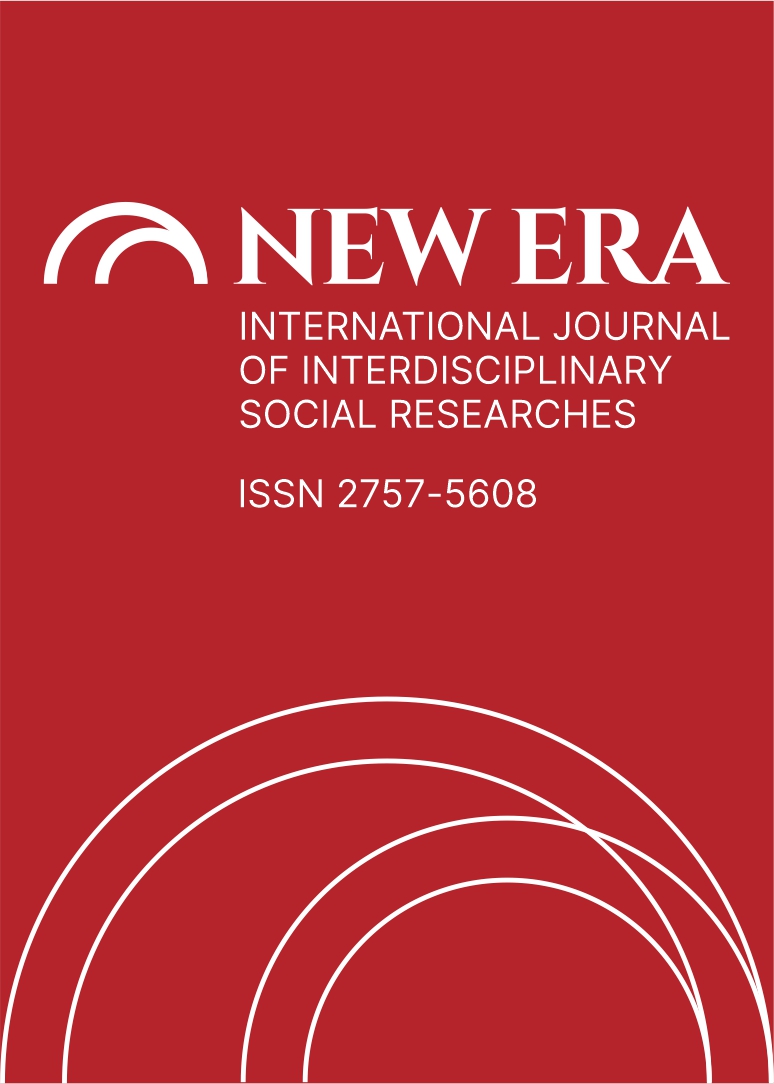ÖĞRETMEN ADAYLARI PODCAST HAZIRLARSA: EDEBİYAT DERSİNE YÖNELİK BİR UYGULAMA
DOI:
https://doi.org/10.5281/zenodo.7752874%20%20Anahtar Kelimeler:
Anahtar Kelimeler:Türk Dili ve Edebiyatı Eğitimi, Podcast, Sözlü İletişimÖzet
Çalışma, podcast uygulaması yoluyla öğretmen adaylarının Türk edebiyatı yazar ve eserlerine yönelik içerik üretmelerini kapsamaktadır. Buna yönelik olarak araştırmada amaç, podcast uygulamasını gerçekleştiren öğretmen adaylarının; edebiyat dersinde işbirlikli çalışmaya yönelik tutumlarını ve bilgi iletişim teknolojileri yeterlik algılarını ele almaktır. Ayrıca öğretmen adaylarının podcast hazırlamaya yönelik düşünceleri de ele alınmıştır. Böyle bir uygulamanın öğretmen adaylarınca deneyimlenmesinin işbirlikli çalışma, teknoloji kullanımı ve konuşma becerilerini geliştirmeye yönelik katkılar sunacağı düşünülmektedir. Çalışma 2021-2022 eğitim öğretim yılı bahar döneminde yeni türk edebiyatı dersi 2 kapsamında otuz altı Türkçe öğretmen adayı ile gerçekleştirilmiştir. Araştırmada nicel ve nitel veri toplama yöntemleri kullanılmıştır. Araştırma sonucunda elde edilen bulgular, öğretmen adaylarının podcast hazırlamaya yönelik işbirlikli çalışma algılarının “yüksek” düzeyde olduğu; öğretmen adayları için bilgi ve iletişim teknolojileri yeterlilik algısı puan ortalamalarının “yeterli” düzeyde olduğu; işbirlikli öğrenmeye yönelik tutumları ve bilgi iletişim teknolojileri kullanmaya ilişkin yeterlilik algıları arasında cinsiyete göre anlamlı bir fark olmadığı yönündedir. Nitel kısma yönelik bulgular öğretmen adaylarının çalışmadan zevk aldıkları, ele aldıkları konuya ilişkin podcast öncesi yaptıkları hazırlıklarla bilgilerinin pekiştiği ve bunun kalıcılık sağladığı yönündedir. Ayrıca konuşma ve seslendirmenin, içerik üretmenin oldukça tatmin edici olduğu, arkadaşlarıyla birlikte çalışmanın zevk verdiği, podcast yoluyla teknoloji kullanımına ilişkin yeni şeyler öğrendiklerini ve eksiklerini gördüklerini ifade etmişlerdir.
Referanslar
Borgia, L. G. (2009). Enhanced vocabulary podcasts implementation in fifth grade
classrooms. Reading Improvement, 46(4), 263.
Brown, D., & Warschauer, M. (2006). From the university to the elementary classroom: Students’ experiences in learning to integrating technology in instruction. Journal of Technology and Teacher Education, 14, 599-621.
Bianchi, P. B. (2018). Designing literary discussion with podcasts. Journal of Adolescent
& Adult Literacy, 61(5), 589–591. https://doi.org/10.1002/jaal.724
Camphell, G. (2005). There is someting in the air: Podcasting in Education, EDUCAUSE Review, 40 (6), 33-46
Carvalho, A. A., Moura, A., & Cruz, S. (2008). Pedagogical potentialities of podcasts in learning: Reactions from K-12 to university students in Portugal. In S.
Cayhan, C. & Karakaş R. (2019). Features of a Structured Podcast to be Used in Teaching Turkish to Foreigners, Karadeniz International Scientific Journal, s. 44: 335-349
Deal, A. (2007). Podcasting: A teaching with technology white paper. Bloomington, IN: AECT & Carnegie Mellon University. Retrieved from http://www.aect.org/publications/whitepapers/ CMU_Podcasting_Jun07.pdf
Dlott, A. M. (2007). A (pod)cast of thousands. Educational Leadership, 64(7), 80-82.
Ducate, L., Lomicka, L. (2009) Podcasting: An Effective Tool for Honing Language Students' Pronunciation? Language Learning & Technology 13(3), 66-86.
Edirisingh, P., Rızzi, C., Nie, M. &Rothwell, L. (2007).Podcasting To Provide Teaching And Learning Support For An Undergraduate Module On English Language And Communication, Turkish Online Journal of Distance Education-TOJDE July 2007 ISSN 1302-6488, Volume: 8 Number: 3 Article: 6
Gill, A.E. (2022). Students' Perceptions And Experiences With Podcasts As A Supplementary Text In A Critical Media Literacy Framework, Doctor Of Philosophy, Department Of Education Specialties Of The School Of Educatıon, St. John’s Unıversıty.
Gribbins, M. (2007). The perceived usefulness of podcasting in higher education: A
survey of students' attitudes and intention to use. MWAIS 2007 Proceedings, 6.
Görgün, A. (2015).A case study on the effects of teacher-structured out-of-class ict activities on listening skills, motivation and self-efficacy, Çukurova University, Doctoral thesis
Guy, R., & Marquis, G. (2016). The flipped classroom: A comparison of student
performance using instructional videos and podcasts versus the lecture-based
model of instruction. Issues in Informing Science and Information Technology,13, 1-13. http://www.informingscience.org/Publications/3461
Grisham, D. L. & Wolsey, T. D. (2012).Creating Podcasts: 21st Century Literacy Tools for Secondary Teacher Candidates, Journal of School Connections . Vol. 4, Issue 1, p. 53-79. 27
Kim, D. (2009a). Innovative educational technology in your classroom in a global context. EssentialTeacher, 6(1), 37-39.
Kim, D. (2009b). Podcasting and online journals: ESOL resources. In G. Strong, & A. Smith, (Eds.), Adult Learners: Context and Innovation (pp. 31-38). Alexandra, VA: TESOL.
King, K. P., & Gura, M. (2007). Podcasting for teachers: Using a new technology to revolutionize teaching and learning (2nd ed.). Series: Emerging technologies for evolving learning. Charlotte, NC: Information Age Publishing
Kiper, A. (2016). Cooperative learning scale: validity and reliability study, International
Journal of Educational Research Review, 1 (2), 42-48.
Lee, M. J. W., & Chan, A. (2006). Exploring the potential for podcasting to deliver mobile ubiquitous learning in higher education. Journal of Computing in Higher Education, 18(1), 94-115.
Lonn, S., & Teasley, S. (2009). Podcasting in higher education. Internet and Higher Education, 12(2), 88- 92.
Lyndon, D. (2012) :Using blogs and podcasts in the history classroom, Using New Technologies to Enhance Teaching and Learning in History (Edited By Terry Haydn), Edition1st Edition, London: Routledge
Mapuva, J., Stoltenkamp, J. & Muyengwa, L. (2010). Blogs, wikis, podcasts: Harenssing technology for enhanced learning achievement through powerful web tools. International Journal of Instructional Technology and Distance Learning, 7(12), 3-16.
Putman, S. M., & Kingsley, T. (2009). The atoms family: Using podcasts to enhance the
development of science vocabulary. The Reading Teacher, 63(2), 100-108.
Richardson, W. (2006). Blogs, wikis, podcasts and other powerful web tools. Thousand Oaks, CA: Corwin Press.
Rosell-Aguilar, F. (2007). Top of the pods: In search of a podcasting “podagogy” for language learning. Computer Assisted Language Learning, 20(5), 471–492.
Stanley, G. (2006). Podcasting: Audio on the Internet comes of age. TESL-EJ, 9(4), 1-7.
Şad, S.N. ve Nalçacı, Ö.İ. (2015). Prospective Teachers’ Perceived Competencies about Integrating Information and Communication Technologies into Education, Mersin University Journal of the Faculty of Education, 11(1), 177-197.
Thorne, S., & Payne, J. (2005). Evolutionary Trajectories, Internet-mediated Expression, and Language Education. CALICO, 22(3), 371–397.
Tynan, B., & Colbran, S. (2006). Podcasting, student learning and expectations. Proceedings of the 23rd Annual Ascilite Conference: Who’s learning? Whose technology?, 825-832.
İndir
Yayınlanmış
Nasıl Atıf Yapılır
Sayı
Bölüm
Lisans
Telif Hakkı (c) 2023 NEW ERA INTERNATIONAL JOURNAL OF INTERDISCIPLINARY SOCIAL RESEARCHES

Bu çalışma Creative Commons Attribution-NonCommercial 4.0 International License ile lisanslanmıştır.


